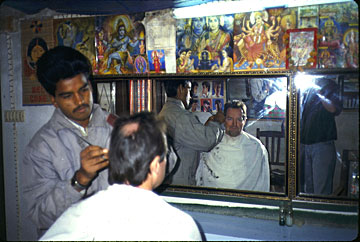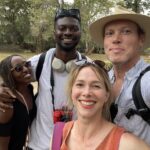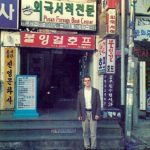Larry Habegger was born in Minneapolis in 1952 and grew up in Minnesota’s landlocked expanses. As a child he had three compelling dreams: to see a mountain, to see an ocean, and to play Major League Baseball. He was able to fulfill two of those dreams. He saw his first ocean and mountain when he was 14 on a family trip from Minnesota to Florida. The closest he got to the Big Leagues was when he flied out against future Hall of Famer Dave Winfield when they faced each other in their teens in American Legion Baseball.
Habegger began publishing his writing about adventure and offbeat travel in 1980. His travel stories have appeared in magazines and newspapers in the U.S. and abroad, including Outside, Travel & Leisure, and the Los Angeles Times. In the early 1980s he co-authored mystery serials for the San Francisco Examiner with James O’Reilly, his old friend from Dartmouth and former disc jockey partner. Since 1985 their safety and security column, “World Travel Watch,” has been syndicated in major newspapers in five countries. In 1993 Habegger and O’Reilly founded the publishing company Travelers’ Tales with James’s brother Tim. Larry and James have worked on more than fifty titles, winning many awards for excellence, including the Lowell Thomas Award for best travel book of the year. For many years, Larry has been an active member of the Society of American Travel Writers (SATW) and the Bay Area Travel Writers.
Habegger has visited almost fifty countries and six of the seven continents. He lives with his family on Telegraph Hill in San Francisco but travels whenever possible, feeling that exposure to the greater world and its diverse cultures is the best way to understand yourself.
How did you get started traveling?
By dreaming. I think this is the first step anyone takes when setting out into the wide world. I grew up in landlocked Minnesota (well, it borders Lake Superior which reaches eventually to the sea, but Minnesota when I was a boy felt as landlocked as Kansas) with barely a bump in the prairie for hundreds of miles. My dreams reached to oceans and mountains and I had visions of seeing both some day. Later, after I’d seen both and forgotten that they had been a touchstone for me, I realized that it was those dreams that had kindled the wanderlust that is still with me. Leaving home to go to college in New Hampshire was another formative spur. Once out of the nest I wanted to keep going, and after arriving in San Francisco after getting out of college I was so close to Mexico and points south (and the Pacific Ocean and points west, obviously), I couldn’t resist. A quick run through Mexico and Central America sealed things, and I’ve been traveling annually ever since.
How did you get started writing?
Like many people in the second year of a college education, I had no idea what I intended to do with my life, and when it came time to choose a major course of study I abandoned other embryonic plans to be a renowned biologist and decided to study what I most enjoyed, and that was literature. The pursuit of reading and studying great literature sparked the desire to write, and after several years I finally discovered that I was not a crafter of great literature, not novels or short stories, anyway. Almost by chance I discovered that keeping journals of my travels and then shaping them into stories that I found interesting (narratives, not just pieces designed to fit a newspaper or magazine format) seemed to appeal to travel editors as well. And fortunately, this turned out to be the writing I most enjoyed doing.
What do you consider your first “break” as a travel writer?
I suppose if there was any “break” it was hearing from an editor, after I’d sent in a story from India, that he’d already run the story and wanted to know how to pay me for it. He had high praise for the piece, said things like “lovely writing,” “lyrical description,” “really evoked the place and experience for me,” and I realized I could do this.
Another “break” would be the editor James and I had at the San Francisco Examiner for our mystery serials, Pamela Brunger. She oversaw the travel section as well and for an important period ran pretty much everything we wrote about travel.
When and how did Travelers Tales come into existence?
James O’Reilly and I first worked together as late night disc jockeys at Dartmouth College. A few years later we began traveling and writing about our experiences, including launching “World Travel Watch,” a syndicated column that advises travelers of political and health hazards around the world.
In 1991 James’s brother, computer book publisher Tim O’Reilly, came face to face with an unfilled need in travel publishing. In planning a trip to the Great Barrier Reef, he found to his frustration that traditional guidebooks were not helping him decide which islands to visit off the coast of Australia. Every island sounded great in one way or another. How to find what was right for him? What helped him choose was a story he read about one woman’s experience traveling with her son. In other words, the story he read enabled him to make better use of the guidebook information.
Tim, a publisher and information expert, and James and I, veteran travel journalists, then decided to put together a new kind of travel guide. Each book would be like getting together in a cafŽ full of interesting people who had already been where we were thinking of going, and could answer the question, “What’s it really like to be there?” We found that the best travel stories were far more than memorable anecdotes — they transferred huge amounts of information from one traveler to another, and made regular guidebooks far more useful. As one reviewer said “I feel like I’ve already been there, and now I am preparing for my second trip.”
The Travelers’ Tales series quickly took on another, and deeper, aspect. The books became chronicles of personal transformation through travel, full of experiences that were life-changing and life-enhancing. Travelers’ Tales thus became a series of travel books not only for the mind, but for the heart and soul.
As a traveler and fact/story-gatherer, what is your biggest challenge on the road?
To discipline myself to expand my notes at the end of the day. The details slip almost immediately if not recorded and amplified before sleep comes. Conversations, especially, must be scribbled down as soon after they occur as possible or for me they are like mist before a rising sun, gone in moments.
What is your biggest challenge in the writing process?
Making the time to write. If I can create an open window of time without distractions from the phone, friends (or enemies!), the process usually works itself out. Of course even when the time is set aside writing is seldom easy, but the hardest part for me is not doing enough of it. You might not think it but you can lose your touch if you’re not careful.
What about the editing and publishing process?
The editing process requires stepping back, being dispassionate, and zeroing in on the real story. The hardest part of this for most people is letting go of passages you like when they get in the way of the story. But this is necessary, and the only way to hone something and make it shine. Often it’s easier to do on other people’s work than your own because it’s hard not to care about pearls and gems even if they are distracting. You’ve got to have faith that those images, expressions, turns of phrase, won’t vanish completely never to be seen again. They’ll resurface another time in another place where they’ll work.
The challenge in the publishing process is making everyone happy, including yourself. For me, if I’m working with editors I want to make sure they get what they want, within reason, of course. This is where the issue of preciousness really comes into play. I can’t allow myself to feel too precious about what I’ve written if I’ve written it for someone else. If certain passages don’t work by the editor’s estimation, then I rework them till they do. I try to remember to pick the battles that count, and don’t get worked up over the ones that don’t. When I’m on the other side of the fence, editing someone else’s work, I know what I need for a Travelers’ Tales book, and I do my best to communicate that to the writer in a way that is both respectful and persuasive. Most writers, when they hear thoughtful, honest criticism, respond to it. Usually when working on a piece to make it a strong Travelers’ Tales story we improve the piece and the writer recognizes that. The challenge, and the opportunity, is to reach that result.
What is your biggest challenge from a business standpoint? Finances? Promotion? Relationships?
For Travelers’ Tales, it’s selling enough books to support the publishing we do. The cost of publishing books is way beyond the obvious and it’s extremely difficult to make the numbers work. This is our eternal challenge, a mystery we’re still trying to solve.
For me as a freelancer, it’s finding the time to do the promotion necessary to build new contacts. As anyone knows, that’s a very time-intensive process, sometimes distasteful, but a very necessary task. Once relationships are established it’s a lot easier, but then of course you’ve got to nurture those relationships. And finance? That’s always a challenge. There’s never enough coming in to cover what you want to do.
Do you do other work to make ends meet? If so, what kind of work?
When I was strictly freelancing I spent years working nights in bars. It was fun work, but hard, especially as the years passed. It’s definitely a young person’s trade. But it allowed me to pursue my writing every day, and the flexibility of the industry allowed me to travel virtually at will. It also gave me a much needed social outlet, a place to hang out with friends after a long, solitary day at the typewriter (yes, I started doing this on a typewriter!) while making money at the same time. These days my job at Travelers’ Tales is more than full time and I have two young daughters who get the rest of my attention, so the thought of doing something else makes my head spin. I continue to do freelance writing, however, when the girls have gone to bed.
What travel authors or books might you recommend and/or have influenced you?
Pardon me for saying something so self-serving, but the best books for writers interested in travel or travelers interested in writing are the books we publish, Travelers’ Tales. I say this because we’ve built our list and reputation on showcasing the best writing about travel from famous authors and unknowns. We take excerpts from books, magazines, and newspapers, and we publish original material. We are dedicated to travel as transformation, to strong narrative storytelling, and to the communication of people’s meaningful experiences. Each of our collections is a library of stories and pointers to outstanding books on the subject. If you start with a Travelers’ Tales, you’ll know where else you want to go to supplement your reading.
Having said all that, the list of authors and/or books I’d recommend is almost endless. Read the books in our Footsteps series (by Laurie Gough, Mikkel Aaland, Allen Noren, Brad Newsham, David Yeadon, Doug Lansky); read some of the big names in travel writing because they’re all worth it for varying reasons (Jan Morris, Pico Iyer, Paul Theroux, Colin Thubron, Norman Lewis, Eric Newby, Tim Cahill, Bruce Chatwin, Robyn Davidson, scores of others); read great literature about places; just read, read, read.
It’s a cliché to say, but when I was plotting my first trip around the world I read Paul Theroux’s Great Railway Bazaar and that was all I needed to hear. But around the same time I also read his short story collection about the East, The Consul’s File, and that brought the place alive in a different way. Very evocative, and romantic in an odd sort of way.
What advice and/or warnings would you give to someone who is considering going into travel writing?
Decide what and how you want to write, whether to a set form for magazine or newspaper publication, or for expressing the emotions you’re feeling in your life as you travel. Then see how you can merge the two if that’s what appeals to you. Don’t expect to make a lot of money as a writer, whether about travel or anything else. Build relationships and tend them, because they return the investment in ways you can’t predict and they enrich your life. Travel, and business when conducted admirably, is all about people
What is the biggest reward of life as a travel writer?
Meeting people, exploring the world, coming to understand myself in a larger context than would otherwise be possible.
As an editor and publisher, what are you looking for from writers?
Transcendent stories told effectively. Sounds pat, but it’s true. The writing must be crisp, can be poetic, should be evocative, and must tell a meaningful story without needless obstructions. The power in any writing is communicating clearly, and the best communication device is a good story, well told.
What to you are the characteristics of outstanding travel writing?
Much as I said above. The narrative must be clear, and the story told must have meaning. I want to be moved, and learn something about the world, a place, people, the author, and myself, through a simple story told well.





